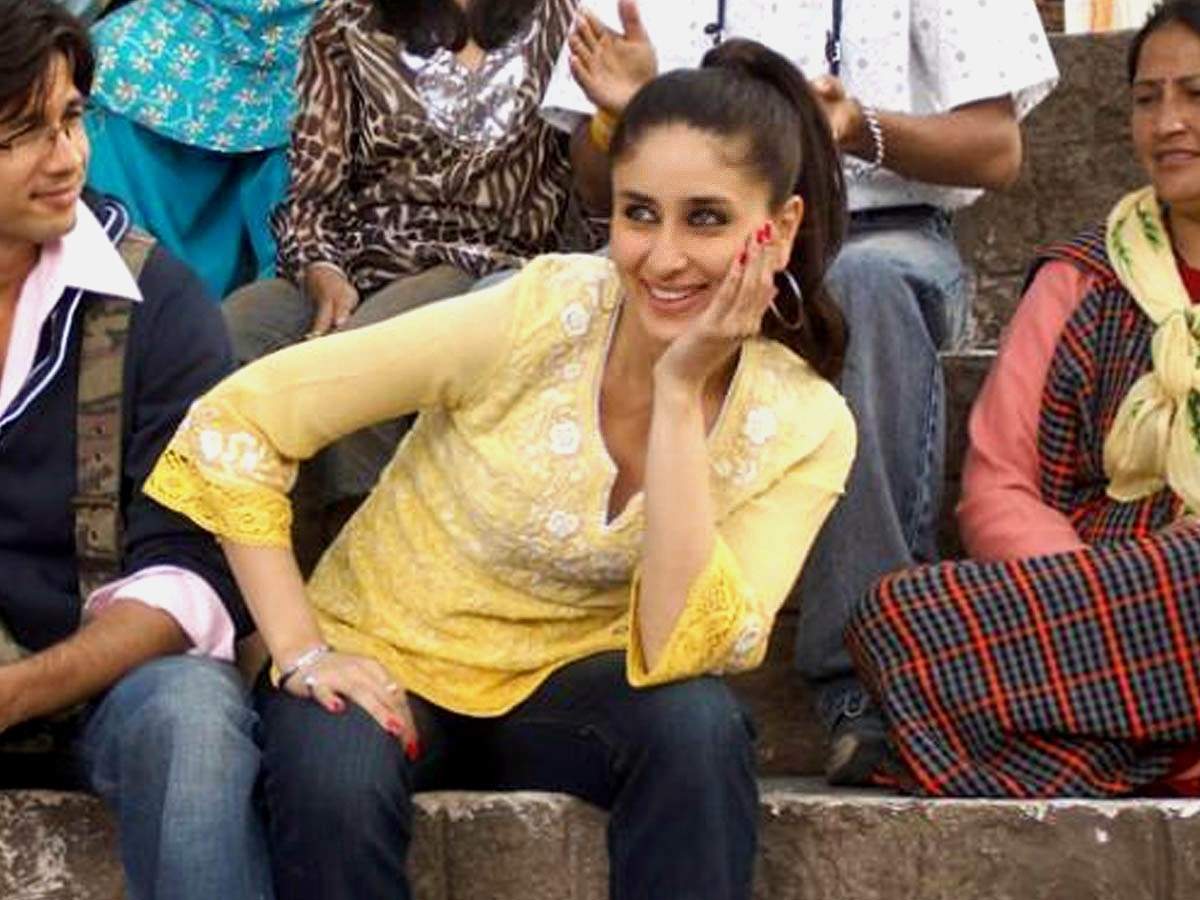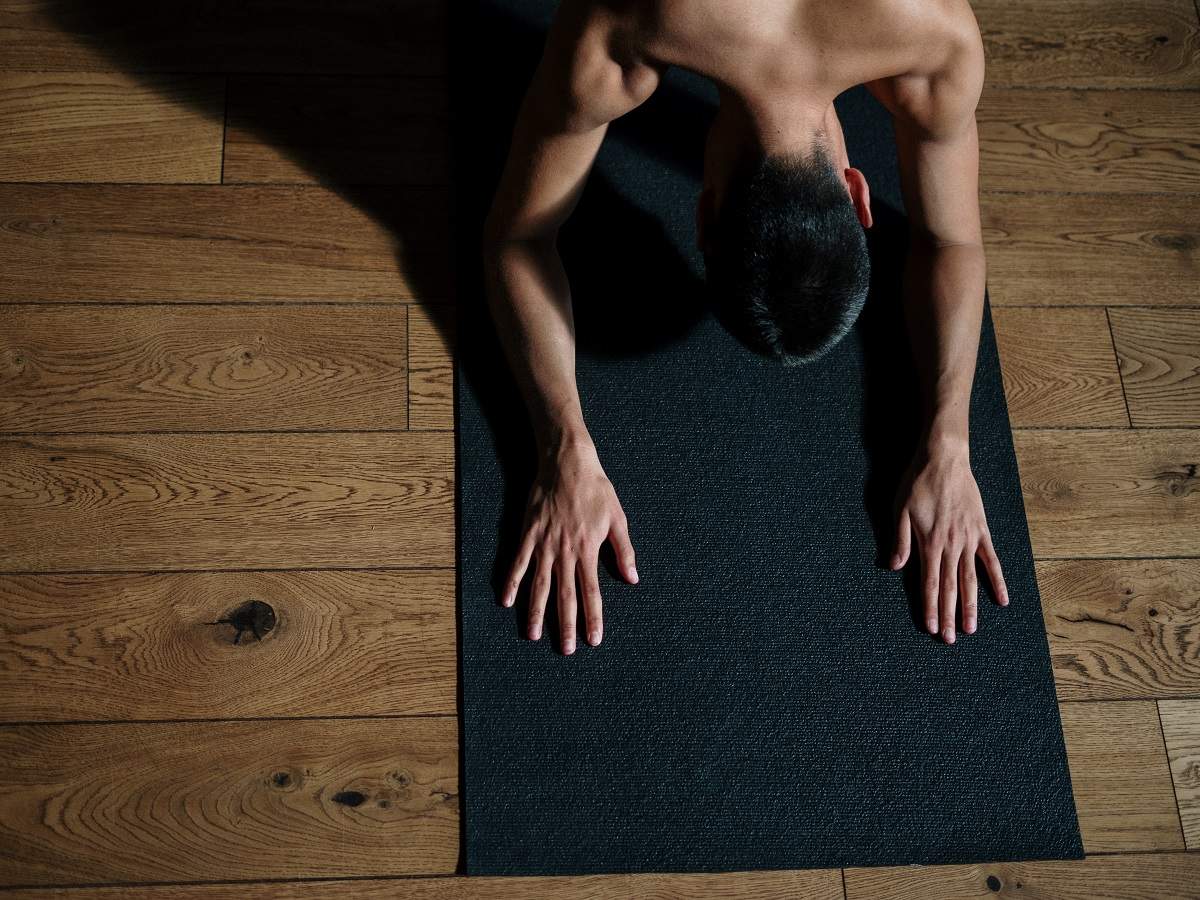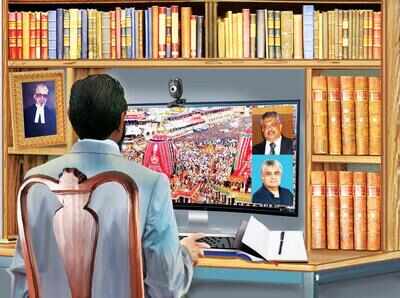
Nagpur: In a historic first, the supreme court heard an important case regarding 238-year-old Jagannath Puri rath yatra over videoconferencing from the city. The court also passed an order allowing the yatra with strict riders, including imposition of curfew in the temple town to prevent devotees from congregating.
Chief justice of India Sharad Bobde heard the case at his home in Nagpur. Two judges — Dinesh Maheshwari and AS Bopanna — were seated in their respective chambers in supreme court at Delhi. The lawyers argued the case from their respective offices. Noted lawyer Harish Salve pleaded for Orissa government from his London home while Tushar Mehta representing the Union of India argued from his office in Delhi.
The hearing began at 3.30pm, as the CJI was connected through video conferencing with other judges and lawyers representing various parties, who had challenged apex court’s June 18 order staying the historic event due to Covid-19 pandemic. About a dozen applicants, including hereditary chief servitor of Lord Jagannatha of the temple Janardhan Pattajoshi Mohapatra, were seeking modification of court’s June 18 order.
There were some disruptions in the online hearing and voices couldn’t be heard clearly. As lawyers from all parties started speaking simultaneously, CJI asked them not to speak over one another and ensure only one person talked at a time. The judge also rapped a lawyer who started arguments while the order was being dictated. He directed the registry not to allow anyone to speak during dictation.
Justice Bobde also restrained the media from reporting the court’s decision till the order is signed by all three judges. He told the subordinates to type the draft and send it through email to Justices Maheshwari and Bopanna for clearance and signature.
While dictating the order, the CJI clarified that the apex court wasn’t disposing of the petition but allowed the Odisha government to take final call as per the situation, including stopping of Yatra.
The hearing earlier began with Mehta pleading on Centre’s behalf praying for allowing the Yatra. He contended they had discussed the formalities with Puri temple trust and Shankarayacharya of the town. He said the Yatra could be conducted with cooperation of state and temple trust and without compromising on citizens’ health.
Assuring that the Yatra would only be allowed in Puri and not across Odisha, Salve informed that state wouldn’t allow public gathering and the chariot would be pulled by police personnel. He added the event will be telecast live for the public and curfew would be imposed to prevent the people from gathering.
“The state would take full precaution before permitting the event and coordinate with temple trust and the Centre to make things smooth,” Salve, who also hails from the city, assured.
Reminding the petitioners and respondents about outbreak of diseases like cholera and plague in 18th and 19th century that spread like “wildfire” due to people’s participation in such ritual congregations, the CJI warned that the situation could turn dangerous if rules framed for containing Covid-19 were ignored.
When one of the petitioners pointed out that 2,500 pandas who work at the popular shrine would be a part of the Yatra, the SC bench clarified it could not “micro-manage” the rituals and “left it to the wisdom of state, Centre and temple management to deal with that issue”.
Quoting the state’s affidavit, the CJI stated that earlier the SC restrained the event due to threat of coronavirus infection, but after its assurance, it might be possible to conduct it “in a limited way without public attention”. “The state shall maintain a record containing details of all those who will be allowed to participate in yatra along with details of their medical condition after testing,” the bench said.
Chief justice of India Sharad Bobde heard the case at his home in Nagpur. Two judges — Dinesh Maheshwari and AS Bopanna — were seated in their respective chambers in supreme court at Delhi. The lawyers argued the case from their respective offices. Noted lawyer Harish Salve pleaded for Orissa government from his London home while Tushar Mehta representing the Union of India argued from his office in Delhi.
The hearing began at 3.30pm, as the CJI was connected through video conferencing with other judges and lawyers representing various parties, who had challenged apex court’s June 18 order staying the historic event due to Covid-19 pandemic. About a dozen applicants, including hereditary chief servitor of Lord Jagannatha of the temple Janardhan Pattajoshi Mohapatra, were seeking modification of court’s June 18 order.
There were some disruptions in the online hearing and voices couldn’t be heard clearly. As lawyers from all parties started speaking simultaneously, CJI asked them not to speak over one another and ensure only one person talked at a time. The judge also rapped a lawyer who started arguments while the order was being dictated. He directed the registry not to allow anyone to speak during dictation.
Justice Bobde also restrained the media from reporting the court’s decision till the order is signed by all three judges. He told the subordinates to type the draft and send it through email to Justices Maheshwari and Bopanna for clearance and signature.
While dictating the order, the CJI clarified that the apex court wasn’t disposing of the petition but allowed the Odisha government to take final call as per the situation, including stopping of Yatra.
The hearing earlier began with Mehta pleading on Centre’s behalf praying for allowing the Yatra. He contended they had discussed the formalities with Puri temple trust and Shankarayacharya of the town. He said the Yatra could be conducted with cooperation of state and temple trust and without compromising on citizens’ health.
Assuring that the Yatra would only be allowed in Puri and not across Odisha, Salve informed that state wouldn’t allow public gathering and the chariot would be pulled by police personnel. He added the event will be telecast live for the public and curfew would be imposed to prevent the people from gathering.
“The state would take full precaution before permitting the event and coordinate with temple trust and the Centre to make things smooth,” Salve, who also hails from the city, assured.
Reminding the petitioners and respondents about outbreak of diseases like cholera and plague in 18th and 19th century that spread like “wildfire” due to people’s participation in such ritual congregations, the CJI warned that the situation could turn dangerous if rules framed for containing Covid-19 were ignored.
When one of the petitioners pointed out that 2,500 pandas who work at the popular shrine would be a part of the Yatra, the SC bench clarified it could not “micro-manage” the rituals and “left it to the wisdom of state, Centre and temple management to deal with that issue”.
Quoting the state’s affidavit, the CJI stated that earlier the SC restrained the event due to threat of coronavirus infection, but after its assurance, it might be possible to conduct it “in a limited way without public attention”. “The state shall maintain a record containing details of all those who will be allowed to participate in yatra along with details of their medical condition after testing,” the bench said.

Coronavirus outbreak
Trending Topics
LATEST VIDEOS
City
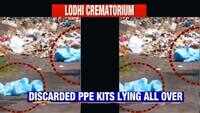 Shocking Covid-19 lapse: Discarded PPE kits lying all over in Delhi's Lodhi crematorium
Shocking Covid-19 lapse: Discarded PPE kits lying all over in Delhi's Lodhi crematorium  UP: Among 7 pregnant girls, 5 tested Covid-19 positive at shelter home, says Kanpur DM
UP: Among 7 pregnant girls, 5 tested Covid-19 positive at shelter home, says Kanpur DM 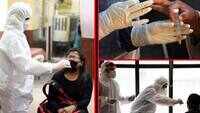 Covid-19: Delhi surpasses Tamil Nadu, now second worst-hit
Covid-19: Delhi surpasses Tamil Nadu, now second worst-hit 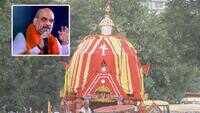 Entire nation is delighted, Union Home Minister Amit Shah welcomes SC decision allowing Puri Rath Yatra
Entire nation is delighted, Union Home Minister Amit Shah welcomes SC decision allowing Puri Rath Yatra
More from TOI
Navbharat Times
Featured Today in Travel
Quick Links
Kerala Coronavirus Helpline NumberHaryana Coronavirus Helpline NumberUP Coronavirus Helpline NumberBareilly NewsBhopal NewsCoronavirus in DelhiCoronavirus in HyderabadCoronavirus in IndiaCoronavirus symptomsCoronavirusRajasthan Coronavirus Helpline NumberAditya ThackerayShiv SenaFire in MumbaiAP Coronavirus Helpline NumberArvind KejriwalJammu Kashmir Coronavirus Helpline NumberSrinagar encounter
Get the app


